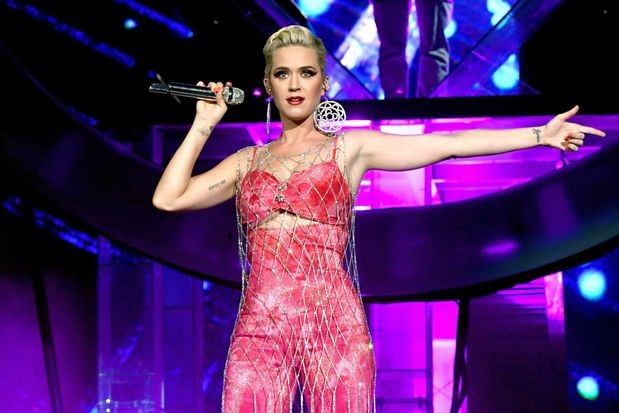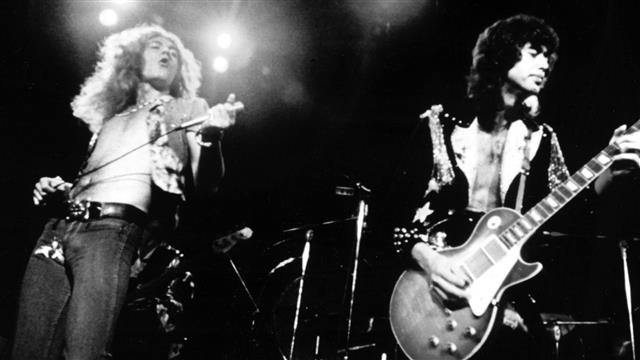Who Wrote ‘Stairway to Heaven’? Music Industry Braces for Copyright Suits
A $2.8 million judgment against Katy Perry has record business worried about an onslaught of infringement cases

PHOTO:KEVIN WINTER/GETTY IMAGES
By Anne Steele
In deciding last week that Katy Perry’s 2013 hit “Dark Horse” copied an 11-year-old Christian rap song, a federal jury in Los Angeles contributed to what music executives worry is a growing trend: infringement cases that claim some of the industry’s most popular songs are rip-offs.
Ms. Perry and her collaborators must pay $2.8 million in damages, the jury found, a decision that has lawyers concerned about similar lawsuits and songwriters worried about stifled creativity.
“I think every music lawyer in the country is screaming right now,” said music-trial litigator Ed McPherson, a copyright specialist whose clients have included Lady Gaga, Fergie and Limp Bizkit.
The jury in Ms. Perry’s case found the singer and other defendants liable for parts of her hit “Dark Horse” that resemble the 2008 Christian rap song “Joyful Noise,” by Marcus Gray, who is known as Flame. Of the $2.8 million in damages awarded to Mr. Gray, the jury said, Ms. Perry was responsible for $550,000 and her label for $1.3 million, with producers paying most of the rest.
The case confirms fears many in the industry had following the 2015 trial over the song “Blurred Lines,” in which the scope of copyright infringement was extended beyond melody and lyrics to include elements contributing to the sound and feel of the music. In 2016, the Ninth Circuit Court of Appeals in San Francisco affirmed the district court’s finding and singers/songwriters Robin Thicke and Pharrell were ordered to pay $5.3 million for copying the 1977 Marvin Gaye hit “Got to Give It Up.”
Now, some attorneys, musicologists and songwriters say these cases are unfairly punishing artists for using generic musical elements. Many are predicting more copyright cases—historically settled behind closed doors, if contested at all—will go to trial, with streaming services making nearly every song in history available for comparison, and courts deciding that songs that merely sound similar are infringing. Others say these cases help protect the creativity of artists. Cases currently before judges involve modern hits, including Ed Sheeran’s “Thinking Out Loud” and the classic rock anthem “Stairway to Heaven.”
In the case of Ms. Perry, the damages were assigned based on the jury’s finding that 22.5% in profits from “Dark Horse” were thanks to material infringed from “Joyful Noise.” In such cases, juries must determine whether the defendant could have access to the alleged infringed song and whether the songs are substantially similar.
The plaintiffs asked jurors to compare a beat found in the songs that the singer’s defense argued are so common they can be found in tunes as standard as “Mary Had a Little Lamb.”
Defense counsel Christine Lepera called the verdict a “travesty of justice.”
Michael Kahn, attorney for the plaintiffs, said: “While losing defendants in music-copyright cases often issue doomsday forecasts for the music world, we’ve been hearing similar predictions going all the way back to the inventions of the player piano and then the radio. The industry is doing fine.” He added that the vast majority of copyright cases either settle or get dismissed before trial.
Mr. Kahn said his clients sought justice for unauthorized taking of their valuable creation.
While $2.8 million might not be crippling to Ms. Perry’s team, it is significant to potential plaintiffs and their lawyers, said Christopher Buccafusco, a professor at Cardozo Law School in New York. “I would think this is a lucrative market to consider entering.”
In some cases, songs that were collecting dust in the archives become worth more if they are infringed upon, he added.
“When Katy Perry uses it and makes it a No. 1 song, it’s much more valuable,” Mr. Buccafusco said.

PHOTO: DAMIAN DOVARGANES/ASSOCIATED PRESS
The “Dark Horse” verdict comes ahead of a closely watched case that began in 2016, when a Los Angeles federal jury decided Led Zeppelin didn’t steal the opening bars of its 1971 hit “Stairway to Heaven” from an obscure single called “Taurus” by the band Spirit. Last year the Ninth Circuit overturned that ruling, saying the judge made errors in the original case.

Image: Everett Collection (Originally published June 23, 2016)
The “Stairway to Heaven” case is slated for rehearing en banc—meaning 11 appellate judges in the Ninth Circuit will decide the case versus the typical panel of three—in September. Lawyers expect the case to set a precedent.
Read The Amicus Brief of 123 Songwriters, Composers, Musicians, And Producers, Along With NSAI and SONA, In Support Of Led Zeppelin, et al. at En Banc Rehearing Here.
Last month, a judge in New York postponed a trial over whether Mr. Sheeran’s “Thinking Out Loud” ripped off “Let’s Get It On”—another Mr. Gaye hit—pending the Ninth Circuit hearing.
Some in the music industry are hopeful the Ninth Circuit decision will clarify the scope of what constitutes infringement.
“There are only 12 notes you can work with, and so things are going to sound alike without technically infringing,” said Mr. McPherson, the music attorney. “The stifling of creativity we predicted after ‘Blurred Lines’ is happening, and after this Katy Perry case it’s going to happen more.”
Source: Appeared in the August 5, 2019, print edition of The Wall Street Journal as ‘Music Industry Braces for More Lawsuits on Copyrights.’
